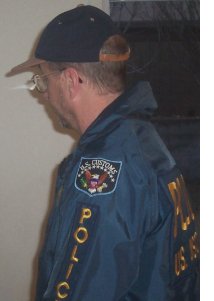|
|
|
|
Whistle-blower appealing firing
Tucson agent says feds made up case
Robert Anglen
The Arizona Republic
Jan. 20, 2004 12:00 AM
 A federal undercover agent in Tucson says he is being fired for complaining that state police roughed up Middle Eastern immigrants during questionable searches.
A federal undercover agent in Tucson says he is being fired for complaining that state police roughed up Middle Eastern immigrants during questionable searches.
Greg Miller, a 13-year veteran of the Bureau of Immigration and Customs Enforcement, says that, instead of taking action against officers who overstepped their bounds, officials have drummed up a series of charges against him.
"Shocked is a good word. I am shocked due to the seriousness of the matter," Miller, 47, said of his supervisors. "This is punishable by severe criminal penalties, and they have done nothing except go after me."
But immigration officials say Miller is being fired for botching a two-year undercover operation to nab arms dealers by accidentally giving his office phone number to the suspects.
"Because of your actions, a case involving an attempt to acquire 10 Tri-Turbo Jet engines used on drones and missiles destined for the Republic of Iran was closed," U.S. Department of Homeland Security supervisor Richard Bailey wrote in a Nov. 3 letter to Miller.
"Your actions compromised the undercover nature of the investigation."
Miller, who remains on leave while his case is appealed, denies the charges, saying the investigation continued long after he gave his phone number to the suspects in July 2002. Miller said the voice mail did not identify him as an immigration agent but did use his real name.
"One of the co-conspirators even sent me an electronic Christmas card last year," he said. "The case was ready. We could have made arrests."
In a letter to Homeland Security Special Agent Kent Johansson in Tucson, Miller's lawyer said it is "preposterous to suggest" that immigration would allow arms dealers to continue operating simply because Miller gave out his phone number.
"The only remaining action was to invite the suspects in question to the Phoenix airport, require them to pass through a security checkpoint . . . and make the arrest," said lawyer David Ross of Beverly Hills, Calif.
Immigration spokesman Russell Ahr said he can't comment about the case but referred to the dismissal letter provided by Miller.
"The reasons are plainly stated in the letter," Ahr said. "Beyond that, I can't go."
The bureau has also accused Miller of leaking sensitive information to sources, using an unauthorized computer for agency work and of being unable to testify in criminal cases.
Miller said all of this is a red herring to discredit his claims of abuse by other law enforcement officers during searches of residences in Tucson and Phoenix.
"The timing in this speaks volumes," he said, adding that he had never been reprimanded or disciplined before filing complaints about the alleged abuse. In fact, he said he has received numerous commendations for his work.
In June 2003, the U.S. Attorney's Office in Tucson sent bureau officials a letter saying Miller could no longer be used as a government witness in criminal prosecutions.
Miller said this stems from problems he had with an assistant U.S. attorney over a case three years ago.
Since then, Miller said the U.S. Attorney's Office has used him in cases, swearing out search warrants and signing off on criminal complaints.
"Following the incident in 2000, I was assigned to an assistant U.S. attorney to work another national security case," he said. "If I was a problem, then they shouldn't be using me."
Officials with the U.S. Attorney's Office for the District of Arizona would not discuss the case or Miller's allegations, saying it is a matter of pending litigation.
"This is an issue between the Bureau of Immigration and Customs Enforcement and their agent," said spokeswoman Harriet Bernick.
Miller called it something else.
"This is an issue about me disclosing civil-rights violations," he said.
As part of a task force with other federal and state law enforcement agencies, the Arizona Department of Public Safety served search warrants in September 2002 as part of an investigation into an auto-theft ring operating in Phoenix and Tucson.Miller said tactical teams were used for the searches, and officers used far more force than necessary. He said individuals targeted in those searches were thrown to the floor, cuffed and humiliated. He said property was seized that had nothing to do with the investigation, including personal photos and other documents.
Department of Public Safety spokesman, Sgt. Bob Ticer, said his office has never heard those complaints.
"Our internal-affairs section has not received any complaints from Mr. Miller," he said. "We take any complaint seriously. If a complaint comes in, we will investigate it."
The Department of Public Safety assists other law enforcement agencies and does have a special operations unit, which can help serve search warrants. The reason Miller said he was involved in one of the searches is because he was assigned to the Joint Terrorism Task Force. Although the searches were supposed to involve an auto-theft ring, Miller said officers treated the case as terrorist-related because Middle Easterners were involved.
In July 2003, Miller was stripped of his gun and badge and assigned to desk duty as a receptionist. He has filed complaints to the Office of Special Counsel and has appealed his case to the Merit Service Protection Board in Denver, which arbitrates appeals for federal employees protesting discipline.
"Since Sept. 1, I have been on paid administrative leave. This has destroyed my trust in management," he said. "But I think I will prevail."
RETURN TO
CUSTOMS CORRUPTION
HOME PAGE
|
|
|
|
|
|